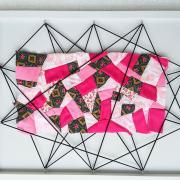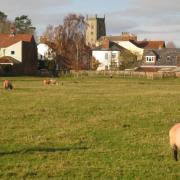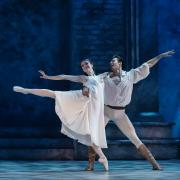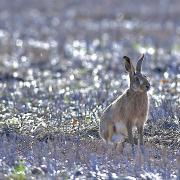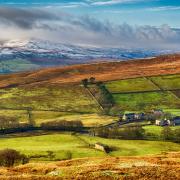Tony Greenway talks to the award-winning ‘Little Voice’ playwright about his life, career and the state of theatre in Yorkshire.

When I ring playwright Jim Cartwright at his home in – whisper it – Lancashire, he feigns shock that I have been able to get through to him at all. ‘It works!’ he says in a broad Bolton accent. ‘There is a direct line between Yorkshire and Lancashire! I thought the call would be intercepted at the very least...’
Cartwright, it turns out, is a jolly soul. But then so would you be if your work had been translated into 37 languages and performed in most major theatres of the world, including the West End, the Royal Court, the National Theatre and Broadway. Still, it’s good to discover that he has no luvvie airs and graces. You get the impression that, despite the five star reviews and armfuls of awards, he has much better things to do than spend his time kissing the air at the Groucho Club. ‘I’m lucky,’ he says. ‘I know I am, because my plays are performed still – and all over the bloomin’ world – and some of them were written a long time ago.’
True. For example, his third play (from 1989) is so popular that it’s almost certainly being performed somewhere right now. ‘It’s amazing,’ he says. And he does sound genuinely mystified by his success, like a man who has won the lottery. ‘It’s keeping me kids in shoes, at any rate.’
One perk of being a writer, he says, is that he enjoys a certain amount of anonymity. ‘But if people find out who I am, they’ll come over and say: “I saw a production of your play and it changed my life”. That makes me think I haven’t lived in vain. What’s really refreshing for an old farty like me, though, is when 16-year-old kids come up and say: “I’m studying your play at college and it’s fantastic”.’

Unless you’re hard-wired into the theatre, Cartwright’s name isn’t, perhaps, as instantly recognisable to Yorkshire theatre audiences as John Godber’s or Sir Alan Ayckbourn’s. He scored a direct hit with his first play, Road, which premiered at the Royal Court in London in 1986, and was an instant sensation, prompting the Sunday Telegraph to call it ‘the debut of a writer of outstanding talent’. Another massive success, The Rise and Fall of Little Voice, featuring the outrageously talented Jane Horrocks, was staged at the National in London in 1992 and later made into a successful film, starring Horrocks and Michael Caine.
Refreshingly, Cartwright will write for big stages and small. In 2012, he produced A Christmas Fair specifically for the Milton Rooms in Malton, North Yorkshire which featured actors setting up and taking down stalls and selling things to the audience. ‘If someone asked me to put on a show in a bus shelter in Bradford, and I had an idea which appealed to me, I would do it,’ he says. ‘I’m not snobby like that. I don’t think: “You’ve been a National Theatre playwright you shouldn’t be writing in a bus shelter”.’ If I get taken with something, I just get taken, and follow the muse.’
Cartwright hasn’t only confined himself to theatre, mind you. He’s also worked in radio and TV, writing Strumpet and Vacuuming Completely Nude in Paradise, both directed by Danny Boyle for the BBC and he wrote and directed the award-winning Johnny Shakespeare, also for the BBC, in 2008. His current ‘to-do’ list is long and involved, but it includes a commission from the West Yorkshire Playhouse in Leeds, a TV series and a feature film called Cornered, which is presently slated to star Sean Bean, Jim Broadbent, Maxine Peake and Tim Spall.
This year, however, there’s a strong Yorkshire dimension to his work because he also starts a brand new partnership with the Theatre Royal Wakefield, whose creative director is... John Godber. ‘I know John well and I have great respect for him,’ says Cartwright. ‘His company operates out of Wakefield and I was talking to him about how it all works and, because of his generosity, I managed to hook up with the Theatre Royal.’
As part of the partnership, he’ll be launching his new theatre company, the Jim Cartwright Company, in Wakefield with a new play called Stand Up Stand Up. Why did he decide to form his own theatre troupe? ‘I saw a white van with “John Godber Company” written on the side, and I thought: “I want one of them!”’ he jokes. ‘Actually, I’ve been thinking about forming my own company for a while but when I got talking to Wakefield Theatre Royal’s new executive director, Katie Town, it went from possibility to reality. Now I’ve come on board, I’m hoping that others will join us, and the theatre will become a powerhouse for northern writers.’
Cartwright, who comes from a working class Lancashire background, isn’t interested in being an ‘issues’ writer. He says, for example, that he wouldn’t write a play about Brexit – it just wouldn’t be his ‘thing’. He wants to produce work that puts bums on seats and he succeeds in his aim. Mark Lawson in the Guardian thinks he ‘is one of a small group of northern dramatists – along with Lee Hall and John Godber – who can write plays that are loved by people who don’t necessarily like theatre’. Does Cartwright recognise that? ‘Yes, I think that’s probably right,’ he agrees. ‘Take my last play, RAZ (a one-man tour de force performed by his actor son, James Cartwright, about the generation who live for the weekend before returning to the drudgery of low-paid work on Monday). The demographic for that was fantastic. It was on at the Edinburgh Festival, then it went to London and then it went on tour. We had older people and we had intellectuals in. And we had young people coming in just for a good night out. I love that. Everybody’s getting a bit!’
Ultimately, he says, he wants to put plays on that are both meaningful and entertaining. ‘That’s important. And having my own company based at Wakefield is a way of returning to the old actor-manager way of doing things.’ Plus, because the Jim Cartwright Company is small, it’s also flexible which means he can get his productions in front of audiences fairly quickly. ‘As an artist, when you get an impulse you want to express yourself immediately,’ he says. ‘It’s that old Judy Garland and Mickey Rooney thing of “Let’s do the play right here!” We’ve got fabulous talent up north and I really do want to use northern actors and northern talent because no matter what people say, there is still a north-south divide. So everything will start at Wakefield and then we’ll go out on tour, bowling down south and showing them how it can be done. We’ll be pitching up in towns and causing havoc, mischief and fun, and putting a bit of life back into theatre.’
Chances are, even if you’ve never seen one of Cartwright’s plays, you’ll have seen the film version of Little Voice (which is set in Scarborough, whereas the play is located in an unspecified northern town). Cartwright wrote the original stage production for Horrocks after working with her in Road but the film version didn’t pan out exactly as he wanted. ‘I knew Jane had this fantastic ability for mimicry,’ he says. ‘She used to do a Shirley Bassey impression as a party piece, for example. So I got thinking: “What would it be like if you were a young girl and, when you opened your mouth, it wasn’t your voice that came out – it was other people’s?”’ The film, with Horrocks impersonating the likes of Bassey, Marilyn Monroe and Judy Garland, was adapted from the play by its director, Bridlington-born Mark Herman. ‘It’s not bad, but it’s a bit schizophrenic because he mixes his writing with my writing,’ says Cartwright. ‘Some scenes are lifted straight from the play which, of course, I would say are the best. There are nice performances in it from Jane and Michael Caine. It’s a bit of a bugbear that people think I wrote it, but it’s become a modern classic, which is nice.’
Yorkshire has been a theatre hot-spot for some years. It’s home to two of the world’s leading and most performed playwrights, for starters: Sir Alan Ayckbourn in Scarborough and Godber. It has Barrie Rutter and his Northern Broadsides Company in Halifax, and a flagship theatre in the West Yorkshire Playhouse in Leeds. Then there’s the Crucible and Lyceum in Sheffield, the York Theatre Royal and myriad venues that host cracking touring productions. And as of 2017 we’ve got Cartwright too.
So now he’s ‘crawled under the wire’ to Wakefield, does he think that the Yorkshire stage is in a healthy state? ‘I think it’s in a fantastic state,’ he says. ‘Katie Town is really good for Wakefield. She’s really clued-in, both creatively and from a business perspective. And she’s come from the National Theatre, so she’s got a really high pedigree. She’s good news – and a force of nature. Then you’ve got the West Yorkshire Playhouse with James Brining (who is artistic director) and he’s a real visionary working in what is, basically, the north’s National Theatre. It’s a fabulous space. Rutter is excellent and a bit like one of those old actor-managers from days gone by. I love him because he’s one-in-the-eye for the old elitist London lot. And there are some great actors from Yorkshire, too. So, yeah I think you should be proud of and pleased with your theatre and celebrate it.’
Stand Up Stand Up runs at Theatre Royal Wakefield from May 3rd-6th.








